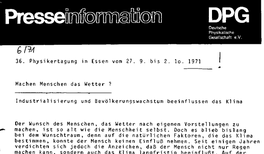Press Release
of the German Physical Society
DPG renews warning of serious consequences of man-made climate change
More than four decades ago, the German Physical Society warned of the dangers of man-made climate change. Before the Bonn Climate Change Conference in June, the DPG now renews its appeal to do everything in its power to reduce the resulting additional greenhouse effect to a tolerable level.
GERMANY, Bad Honnef, 11 June 2019 – The climate is changing. How bad it will be for future generations is a matter of debate among scholars - and what can end catastrophically for whom and when. In a press release in 1971, the German Physical Society (DPG) warned of an imminent "impact of human activities on the climate" and even wrote a memorandum in 1986, which prompted the prestigious German magazine "Der Spiegel" to publish a cover page on which Cologne Cathedral was flooded. Before the Climate Change Conference from 17 to 27 June 2019 in Bonn, Germany, the DPG now renews its appeal to do everything in its power to reduce human-induced climate change to a tolerable level.
Already many decades ago, scientists recognized that the temperature on Earth was sensitive to the concentration of substances now called greenhouse gases: carbon dioxide (CO2), methane (CH4), nitrous oxide (N2O) or the then threateningly high amounts of hydro-chlorofluorocarbons (HCFCs) – as well as water vapour, which is essentially responsible for the natural greenhouse effect without which the Earth would be uninhabitable. The DPG does not ignore the fact that the climate is an extraordinarily complex system and that scientific modelling has not been completed.
If the combustion of coal, oil or gas were not drastically restricted, physicists predicted a CO2 content of at least 500 to 600 ppm (parts per million) in the next 50 to 100 years, according to the Memorandum of 1986. Today the value is already over 400 ppm, thirty years ago still 340 ppm and around 1900 only 270 ppm. The concentration has thus reached a value today that has not been reached for at least 800,000 years.
In addition, the experts assumed that, in the worst case, the Earth's temperature would rise by several degrees Celsius compared with the end of the 1980s. A possible influence of the sun cannot explain the observed long-term variation in the earth's surface temperatures over the past 100 years. It is highly likely that the 2°C target proclaimed in December 2010 by the 194 member states of the United Nations Framework Convention on Climate Change will not be met. As a result, the threat of tropical and subtropical pathogens spreading could make more and more people ill. In addition, sea levels could rise by up to one metre by 2100 in the worst case, although large spatial differences can be assumed. For Germany, for example, meteorologists are forecasting a growing tendency towards summer heat waves due to rising temperatures.
"The conditions under which the climate develops are demonstrably seriously altered by man," says Dieter Meschede, President of the German Physical Society. Even if we still have to act under uncertainty, the DPG repeats the appeal of the signatories of the DPG Memorandum of thirty years ago because of the threatening negative effects of climate change on the living conditions of many people worldwide. It calls for consistent action and reorientation in human dealings with our planet in order to preserve our natural basis for life.
Cited documents:
- Do people make the weather? (in German)
Press release of the Working Group Energy of the German Physical Society on the occasion of the 36th Physicists' Conference in Essen from 27. 9. to 2.10. 1971
- Warning of the DPG of an imminent climate catastrophe in December 1985
(in German)
The German Physical Society (Deutsche Physikalische Gesellschaft e. V.; DPG), which was founded way back in 1845, is the oldest national and, with more than 60,000 members, also the largest physical society in the world. As a non-profit-making organisation it pursues no economic interests. The DPG promotes the transfer of knowledge within the scientific community through conferences, events and publications, and aims to open a window to physics for the curious. Its special focuses are on encouraging junior scientists and promoting equal opportunities. The DPG’s head office is at Bad Honnef am Rhein. Its representative office in the capital is the Magnus-Haus Berlin. Website: www.dpg-physik.de
